|
|
|
Sort Order |
|
|
|
Items / Page
|
|
|
|
|
|
|
| Srl | Item |
| 1 |
ID:
126641


|
|
|
|
|
| Publication |
2013.
|
| Summary/Abstract |
Gulf Cooperation Council countries are seeking to develop their governmental financial information systems to make them more informative and transparent. The aim of this article is to determine the extent to which Qatar has developed its governmental financial information systems in response to the enormous degree of economic and administrative development in recent decades, and to identify the most important factors that have influenced the reforms made in this area. For this purpose, Lüder's Financial Management Reform Process Model (2001) was referred to and semi-structured interviews were carried out with governmental accounting officials in Qatar in June 2011.
|
|
|
|
|
|
|
|
|
|
|
|
|
|
|
|
| 2 |
ID:
126642


|
|
|
|
|
| Publication |
2013.
|
| Summary/Abstract |
This article is an examination of the 'Kurdish Students' Hope Society' - a youth-led Kurdish organization founded in the Ottoman imperial capital, Istanbul, in 1912. The article contends that the foundation of this organization should not be seen simply as a reaction to the gradual ethnic polarization and 'Turkification' of Ottoman politics that occurred in the aftermath of the 1908 'Young Turk Revolution'. It also needs to be understood in the context of dynamics emanating from within Kurdish society. Specifically, to the backdrop of an increasingly fragmented Kurdish elite, the Kurdish youth were setting out their own path towards national salvation which was neither conformist nor separatist. In short, they were outlining a 'third way' between these two extremes.
|
|
|
|
|
|
|
|
|
|
|
|
|
|
|
|
| 3 |
ID:
126633


|
|
|
|
|
| Publication |
2013.
|
| Summary/Abstract |
This study examines political, economic, and strategic relations between Libya and Britain from the Second World War to the 2011 'Arab Spring' conflict in Libya. Analysing primary and secondary sources, this study attempts to determine if a connection exists between the British fighting in Libya during the Second World War and the British-led military intervention in the Libyan 'Arab Spring' revolt against Muammar Qaddafi's regime. Britain retained a strategic and economic presence in Libya in the period following the country's independence in 1951. The rise to power of Qaddafi in 1969, however, changed the course of bilateral ties. Qaddafi nationalized British assets in Libya, and implemented anti-Western policies. Ties with Britain were strained, reaching a low point during the 1980s and 1990s with Libya's persecution of political dissidents in Britain. A brief rapprochement between Tripoli and London from 2001 to 2011 brought normalization of ties and renewed British investment in the Libyan oil sector. However, in February 2011, Britain and its western partners aided Libyan rebels in their fight against Qaddafi, successfully toppling his regime. Today, as the struggle for power continues in Libya - with Islamist groups representing a serious force vying for power - many questions remain concerning the future direction of the Libyan state and society.
|
|
|
|
|
|
|
|
|
|
|
|
|
|
|
|
| 4 |
ID:
126635
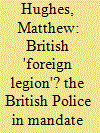

|
|
|
|
|
| Publication |
2013.
|
| Summary/Abstract |
The men of the British section of the Palestine police have romantically imagined their time as officers in Mandate Palestine, a land infused with historical and biblical significance. Many compared their service to that of the famed military force, the French Foreign Legion. This study sets the nostalgia of memory against the reality of service in Palestine, one that involved considerable brutality against local people. This essay details the empirical evidence of violence, including torture and a 'dirty war', mining archival sources, contextualizing primary source material within wider notions of British ideas of collective punishment within the empire. The Palestine police failed in its job of policing, necessitating the deployment of the army to Palestine, and with this collapse in police control the force became more violent. Ironically, the reality of life in the Palestine police was similar to that in the French Foreign Legion: a shock force there to maintain imperial control. The article argues that policing methods from the Mandate period continued after the Palestine force was disbanded in 1948, both within Israel and in other parts of the British Empire where demobilized Palestine police officers went to serve. It pushes the current paradigm on policing, extending the literature that details reforms and institutional change in the Palestine police to include the impact on local people.
|
|
|
|
|
|
|
|
|
|
|
|
|
|
|
|
| 5 |
ID:
126637
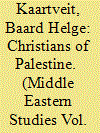

|
|
|
|
|
| Publication |
2013.
|
| Summary/Abstract |
Based on fieldwork in the Bethlehem area, this article uses the issue of internal land disputes as a starting point to describe a series of developments that have served to weaken the Christian communities in Palestine, and to identify some dilemmas they face, as Palestinians and as members of a minority community in Palestine. The article describes a situation where a weak and dysfunctional legal system under the Palestinian Authority (PA) has left Palestinians dependent on family and community networks for security and protection. Due to a history of emigration, combined with distinct social and demographic characteristics, Christian Palestinians find themselves in a position of structural vulnerability, subject to land theft and other criminal violation. Cautious about igniting sectarian divisions, Christian community leaders have a hard time addressing these issues within a public discourse. Fearful of harming Palestinian national interests, they are also reluctant to utilize international contacts and seek external support to secure their own rights and interests in Palestine. The article argues that this reflects both a commitment to an ethos of national unity among Christian Palestinians, and an acute awareness of the impact of 'framing' in preserving sectarian harmony.
|
|
|
|
|
|
|
|
|
|
|
|
|
|
|
|
| 6 |
ID:
126636
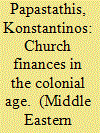

|
|
|
|
|
| Publication |
2013.
|
| Summary/Abstract |
The British Mandatory government established in 1921 a commission in order to control the finances and the vast landed property of the Orthodox Patriarchate of Jerusalem. This paper sketches out the commission's early activity, arguing that its significant powers and its operation at the expense of the clerical apparatus were not so much grounded on the need to facilitate the recovery of the historic church, but were in fact determined by the socio-political developments, at a local and international level, as well as by the necessity to strengthen the British authority in Palestine during a fluid period for public order.
|
|
|
|
|
|
|
|
|
|
|
|
|
|
|
|
| 7 |
ID:
126639


|
|
|
|
|
| Publication |
2013.
|
| Summary/Abstract |
In light of Turkey's changing policy prior to the Erim government, which followed the second Turkish military coup d'état, Israeli Consul General, Efraim Elrom, was kidnapped and then murdered. This essay examines Turkey-Israel relations during and after the murder and observes any changes in the countries' stance toward each other whilst dealing with the Elrom Affair. The essay is based on unexamined primary sources from the Israeli National Archives and State Department.
|
|
|
|
|
|
|
|
|
|
|
|
|
|
|
|
| 8 |
ID:
126644
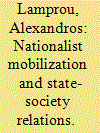

|
|
|
|
|
| Publication |
2013.
|
| Summary/Abstract |
This article studies the campaign against the use of non-Turkish languages that was organized by local forces in Izmir in 1934. In contextualizing the campaign within domestic politics and state-society relation, the article attempts to study domestic politics through a local perspective and explore the impact that similar events in the periphery had in the centre's policies, which the literature is usually inclined to comprehend solely with reference to state 'high politics'. The article argues that cases of autonomous mobilization from below, such as the 1934 Izmir campaign, contributed to the evolution of the Turkish political regime in the 1930s by turning the centre towards decisions that would redesign the relationship between the state and the ruling party, and have an impact on state-society relations.
|
|
|
|
|
|
|
|
|
|
|
|
|
|
|
|
| 9 |
ID:
126640
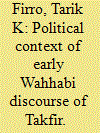

|
|
|
|
|
| Publication |
2013.
|
| Summary/Abstract |
This article compares the takfiri discourse (accusing people of being infidels) of the first and second generation of Wahhabi scholars with that of Muhammad Ibn 'Abd al-Wahhab, the founder of the Wahhabiyya. The article shows that these scholars had revised Ibn 'Abd Wahhab's position toward infidelity; a position which had been adopted by many Wahhabi scholars until the beginning of the nineteenth century. In their revision, they put an end to the ambivalent position toward takfir, emphasizing that warfare was the suitable means of interacting with religious and political opponents. To justify their approach, they reinterpreted not only the writings of the founder of Wahhabiyya but also those of Ibn Taymiyya and other Hanbali scholars. Their takfiri discourse remained alive among large segments of the masses and religious scholars in Sa'udi Arabia until today, though some Sa'udi kings and princes sometimes denounced it.
|
|
|
|
|
|
|
|
|
|
|
|
|
|
|
|
|
|
|
|
|